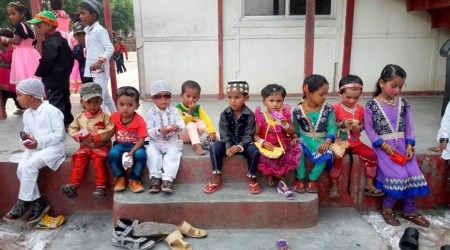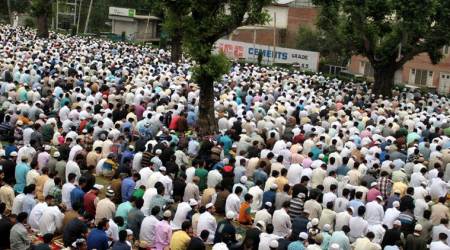 Nearly 20 varieties of goats from across Maharashtra, Rajasthan, Gujarat, Uttar Pradesh, Kashmir and other regions have been brought to the city ahead of Bakrid. Express
Nearly 20 varieties of goats from across Maharashtra, Rajasthan, Gujarat, Uttar Pradesh, Kashmir and other regions have been brought to the city ahead of Bakrid. Express
For the second consecutive year, Salimabi Shaikh, a resident of Kondhwa area, would have to make do without sacrificing an animal as she used to do every year on Eid-ul-Adha or Bakrid as it is popularly known. The reason: her inability to pay for a goat and the state government’s ban on sacrificing a bull, which until two years ago wasn’t a problem.
“Actually, if it is a big animal (a bull), then six or seven people can share its cost and fulfill their duty. That’s what we had been doing all along, with many relatives pitching in together. It used to cost Rs 15,000 to Rs 20,000 and each one’s share used to come to about Rs 2,500 to Rs 3,000. The rate of a small animal (goat), on the other hand, is Rs 10,000, but it cannot be shared. It can be sacrificed by only one person. We cannot afford it, so we had to stop sacrificing animals,” she says.
For Mohammed Anwar Shaikh, however, not sacrificing was not an option. So, he has found another way out. He has decided to make the sacrifice in another state, where killing of bulls is not banned. “We have contacts in Karnataka and Telangana. So, we are planning to go to one of these states for the festival. We have already spoken to the sellers there. That’s what we did last year as well. Until two years ago, we used to get two bulls here locally and it would cost us around Rs 40,000. The cost used to be divided between 10 people,” he says.
It seems Shaikh is not alone. Local beef trader and member of the All India Jamiatul Quresh Action Committee, Arif Chowdhury, says that he himself had booked a bull for sacrifice in Telangana. “It is ironical as I used to supply it here in Pune before the ban, and now we ourselves have to book it in other states. However, for those who cannot afford to buy a goat, there is the option of sharing a buffalo… The starting price could be around Rs 15,000 to Rs 20,000. But a lot of people do not prefer buffalo meat which defeats the purpose of qurbani (sacrifice) and that’s why its demand is not that much,” he said.
Chowdhury said the demand for animals this year was yet to become clear. He said that not more than 700 animals were sold last year while the average sale in the years prior to the beef ban used to be between 3,000-4,000 animals.
Meanwhile, goat traders are claiming that despite the ban on killing of bulls, there has not been any appreciable increase in the price of goats.
The traders say that since most breeders were now rearing goats, supply was adequate, because of which prices were barely 10 per cent higher than that of last year.
Iftekar Patel, who owns Diamond Foods in Fatima Nagar and is president of Bakra Qasab Quresh Welfare Society, a local goat traders body, said that nearly 20 varieties of goats were available in the market. Goats from Maharashtra, Rajasthan, Gujarat, Uttar Pradesh, Kashmir and other regions have been brought to the city with major markets set up at Nana Peth, Bhavani Peth, Hadapsar and Kausar Baug in Kondhwa.
The price starts from Rs 7,000 for a desi gavran variety, Rs 10,000 to Rs 15,000 for a medium-size goat of the Khacchi breed, while some goats which are considered as higher breeds like Kotha from Madhya Pradesh or Sojat from Rajasthan can fetch anything upwards of Rs 25,000.
“Actually an animal’s selling point is usually not really the price, but the beauty of it. There are people who will buy an animal for astronomical price if they like its look. But such buyers are few in Pune, more in Mumbai. Here, it is about budget buying,” said Inaayat Khadke, a trader at Kausarbaug.

